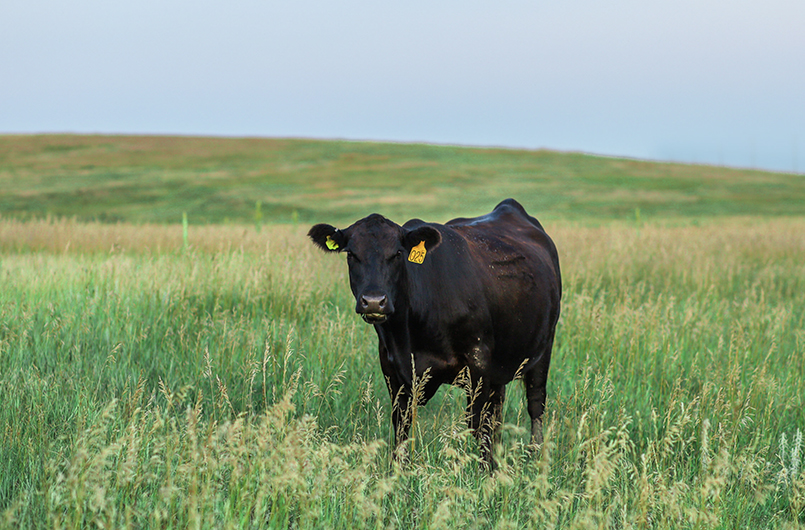
Together with the broader AgSpire team, we have recently attended several of the leading agriculture conferences – including NCBA’s Cattle Con, the International Production & Processing Expo, Commodity Classic, the Annual Meat Conference, and the Animal AgTech Innovation Summit. These conferences convened a diverse group of stakeholders from across the globe—retailers, brands, processors, and producers alike—to delve into the most pressing issues for agriculture and to strategize for the future, such as carbon markets.
While the sustainability conversation is more established in row crop agriculture, it took center stage among livestock stakeholders. Amid the discussions and presentations, a compelling narrative emerged, one that underscores a pivotal moment for the meat sector. The industry stands at the cusp of a transformative opportunity, where the integration of sustainability practices into business models is a strategic business imperative.
This “sustainability flywheel” concept—where investments in sustainability drive meat product sales, which in turn, fuel further sustainability investments—has become a tangible pathway to resilience and growth in difficult economic times.
Here’s a deeper look into the dynamics shaping this opportunity and why carbon markets are important:
> A Synergistic Relationship Between Sustainability and Business Goals
The dialogue around sustainability in the meat industry has often been framed as a cost rather than an investment. However, the narrative is shifting. Sustainability initiatives are increasingly being recognized for their potential to support and amplify business objectives. This shift is pivotal, as it not only validates the investment in sustainability but also promotes a culture of continuous improvement and adaptation.
> Consumer Behavior: The ‘And’ Factor
Today’s consumers, especially the rising Gen Z demographic, exhibit purchasing behaviors that challenge traditional market norms. They seek products that deliver on multiple fronts—quality AND affordability, quantity AND sustainability, etc. This evolving consumer expectation highlights the necessity for meat producers to adopt practices that resonate with the ‘and’ factor, leveraging sustainability as a competitive edge to meet the multifaceted demands of the market. This is a unique opportunity for sustainability to increase its role as a value-add driver of sales.
> The Sustainability Flywheel Effect
At the heart of the conference insights was this concept of the sustainability flywheel effect. This notion encapsulates how sustainability investments can protect producers from economic volatility by maintaining strong consumer demand for their products despite inflation and other macro-challenges. As these investments become ingrained in business operations, they catalyze a virtuous cycle of (sales) growth, innovation, sustainability, and the importance of carbon markets.
> Digital Trends and Sustainability Storytelling
The integration of digital technologies in the shopping experience, particularly among younger consumers, offers a unique platform for sustainability storytelling. The rise in digital ordering and the preference for case-ready products among younger demographics present an opportunity to weave sustainability narratives into the consumer journey, enhancing brand loyalty and driving sales. Younger generations are making fewer, but more intentional trips to the store – sustainability storytelling provided via in-store displays and packaging is primed to play an anchor role in drawing customers in to stores and to the meat counter.
> Conclusion: A Call to Action for the Meat Industry
As we navigate the complexities of an ever-changing economic landscape, the importance of sustainability investments in maintaining robust meat sales cannot be overstated. The insights from these conferences serve as a clarion call for the meat industry to embrace sustainability as a strategic business lever. By fostering a culture of sustainability, the industry can unlock new avenues for growth, resilience, and success in the years to come.
The pathway forward for the meat industry is clear: embracing sustainability and carbon markets is no longer optional but essential. As industry leaders, we are tasked with the responsibility to champion these practices, ensuring that the meat sector remains vibrant, resilient, and aligned with the evolving expectations of our consumers and our planet.
Additional Links
- Learn more about our corporate services here >>> Corporate Services
About the Author
Drew Slattery | Senior Sustainability Project Manager
Drew Slattery, with his extensive experience in the regenerative agriculture and corporate sustainability realm, is committed to enhancing the impact on natural resources and the climate across global supply chains.
Throughout his career, Drew has partnered with leading agricultural and food brands to evolve their supply chains for greater sustainability and reduced carbon footprints. This has given him a broad range of expertise – from remote sensing, to ag media, producer engagement, behavior change programming, and corporate sustainability – and experience working with the beef, dairy, row crop, and specialty crop sectors.